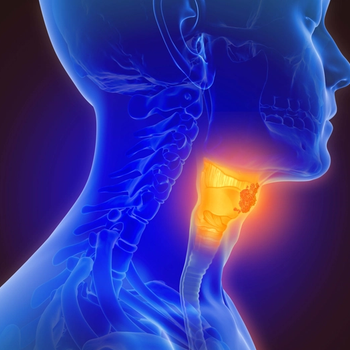
Novel TKI Plus Chemo Dramatically Shrank Advanced Head & Neck Tumors
AZD1775, a small-molecule, WEE1-targeting TKI, significantly shrunk tumors when administered in combination with cisplatin and docetaxel in a phase I trial.
A small phase I dose-finding study in 10 patients with advanced head and neck cancer has shown that adavosertib (also known as AZD1775) administered in combination with cisplatin and docetaxel, significantly shrunk tumors in 9 of the patients enrolled. Adavosertib, a small-molecule inhibitor of the tyrosine kinase WEE1, has potential antineoplastic sensitizing activity.
The late Eduardo Méndez, MD, and colleagues from Fred Hutchinson Cancer Center, Seattle, Wash.,
The majority (about two-thirds) of head and neck cancer tumors carry p53 mutations; as a result, they lack the G1 checkpoint (which is mainly regulated by p53). Instead, these malignant cells repair damaged DNA through the G2 checkpoint.
As explained by the National Cancer Institute it its
The open-label study by Méndez et al enrolled 10 patients with stage III/IVB borderline-resectable or unresectable head and neck cancer. All patients were candidates for definitive chemoradiation. The researchers used a 3+3 dose-escalation design. AZD1775 was administered orally twice a day over 2.5 days during the first week, and then was given in combination with cisplatin (at 25 mg/m2) and docetaxel (at 35 mg/m2) for 3 weeks. Adverse events were the primary outcome measure, to establish the maximum tolerated dose (MTD). Response, pharmacokinetics, pharmacodynamics, and genomic data were secondary outcome measures.
The AZD1775 MTD was determined to be 150 mg orally twice daily for 2.5 days. Responses as measured by RECIST (Response Evaluation Criteria in Solid Tumors) v1.1 were seen in 5 patients, and 3 additional responders were identified following histological adjustment. Grade 3 diarrhea was the only drug-limiting toxicity.
Méndez and colleagues concluded that combination therapy with AZD1775, cisplatin, and docetaxel is safe and tolerable, “with promising antitumor efficacy…meriting further investigation at the recommended phase 2 dose.”
As a
Senior author Laura Q.M. Chow, MD, commented in the news release that “[t]he interesting thing is [that the combination therapy] had more of an effect than we expected. People actually had dramatic shrinkage of their cancers to the point that they didn’t have cancer left at time of surgery.”
This clinical trial was funded by the National Institutes of Health; the American Cancer Society; philanthropic donations to Fred Hutchinson Cancer Center; the Seattle Cancer Care Alliance; and AstraZeneca.
Newsletter
Stay up to date on recent advances in the multidisciplinary approach to cancer.
Related Content


Comparing Quality-of-Life Outcomes With Protons vs Photons in OPSCC

Subcutaneous Amivantamab Earns Breakthrough Therapy Designation in HNSCC












































